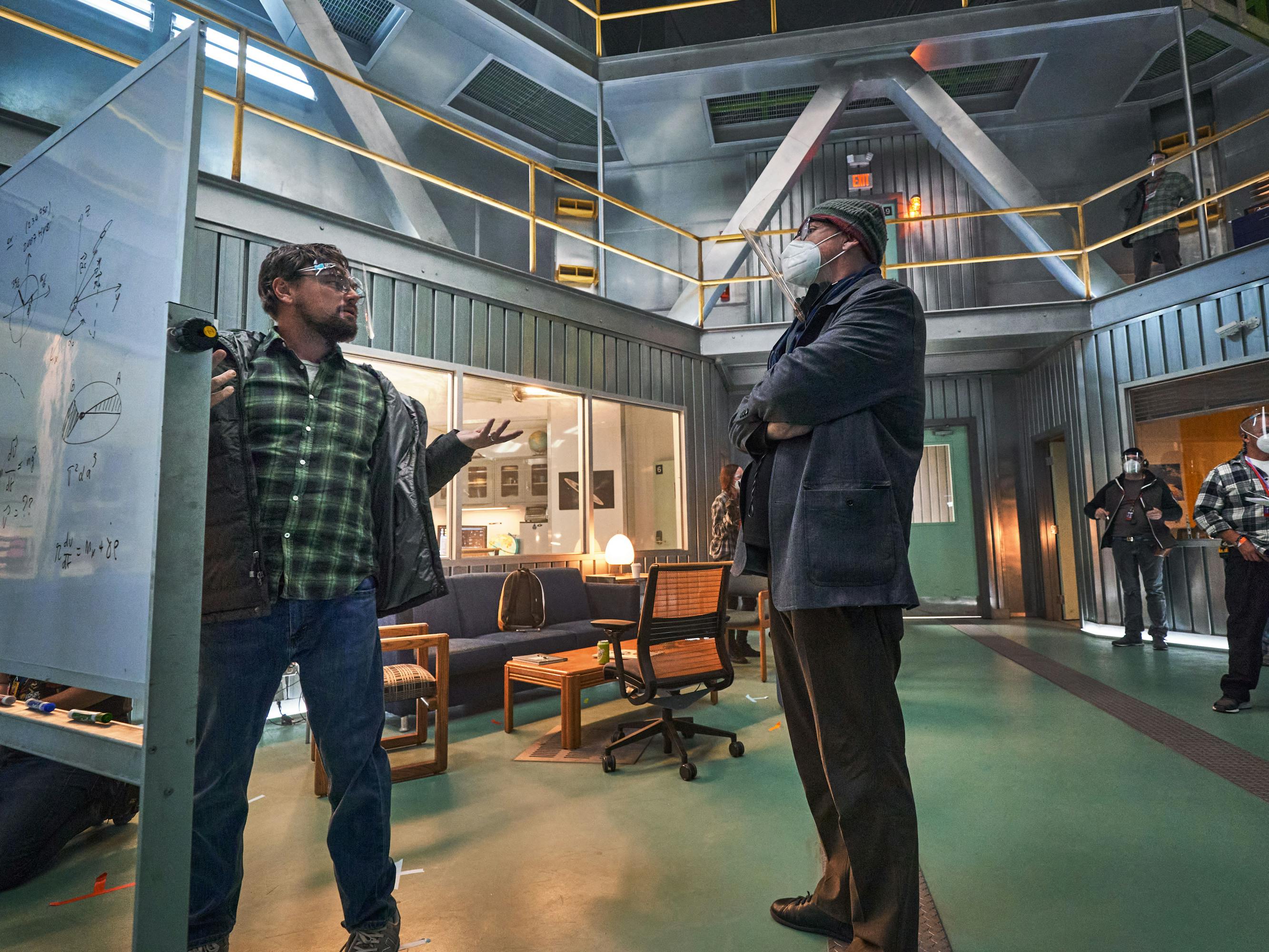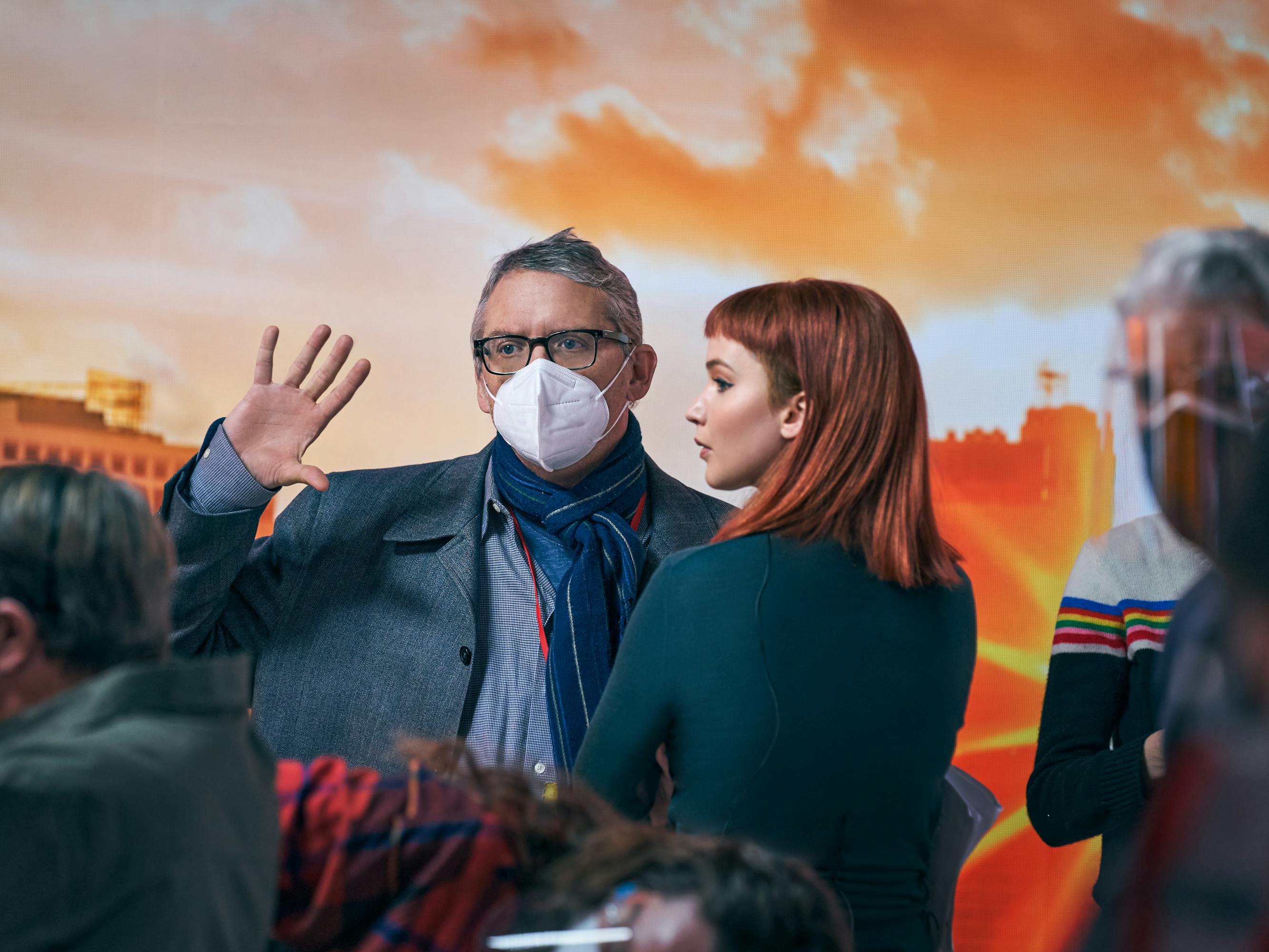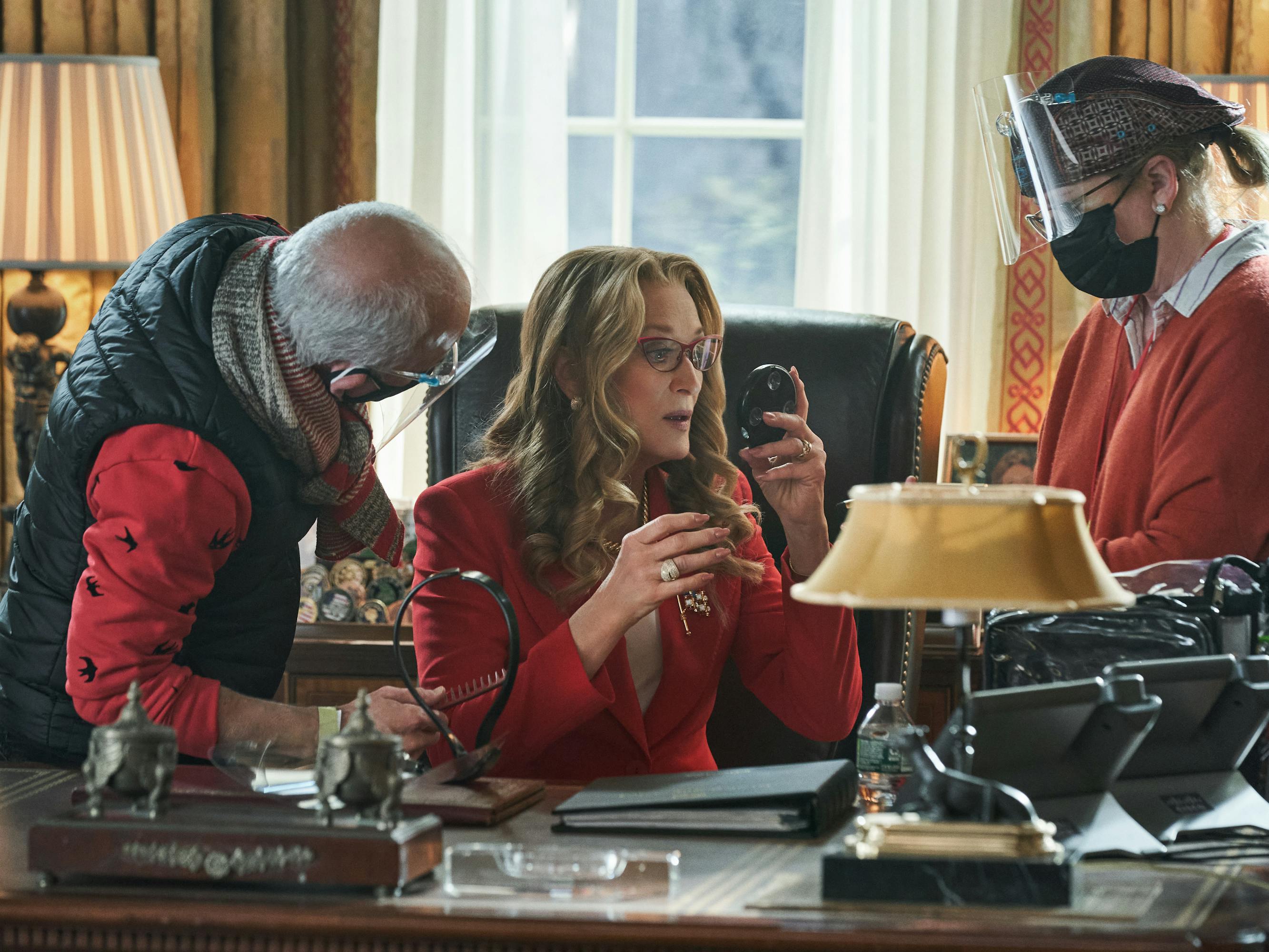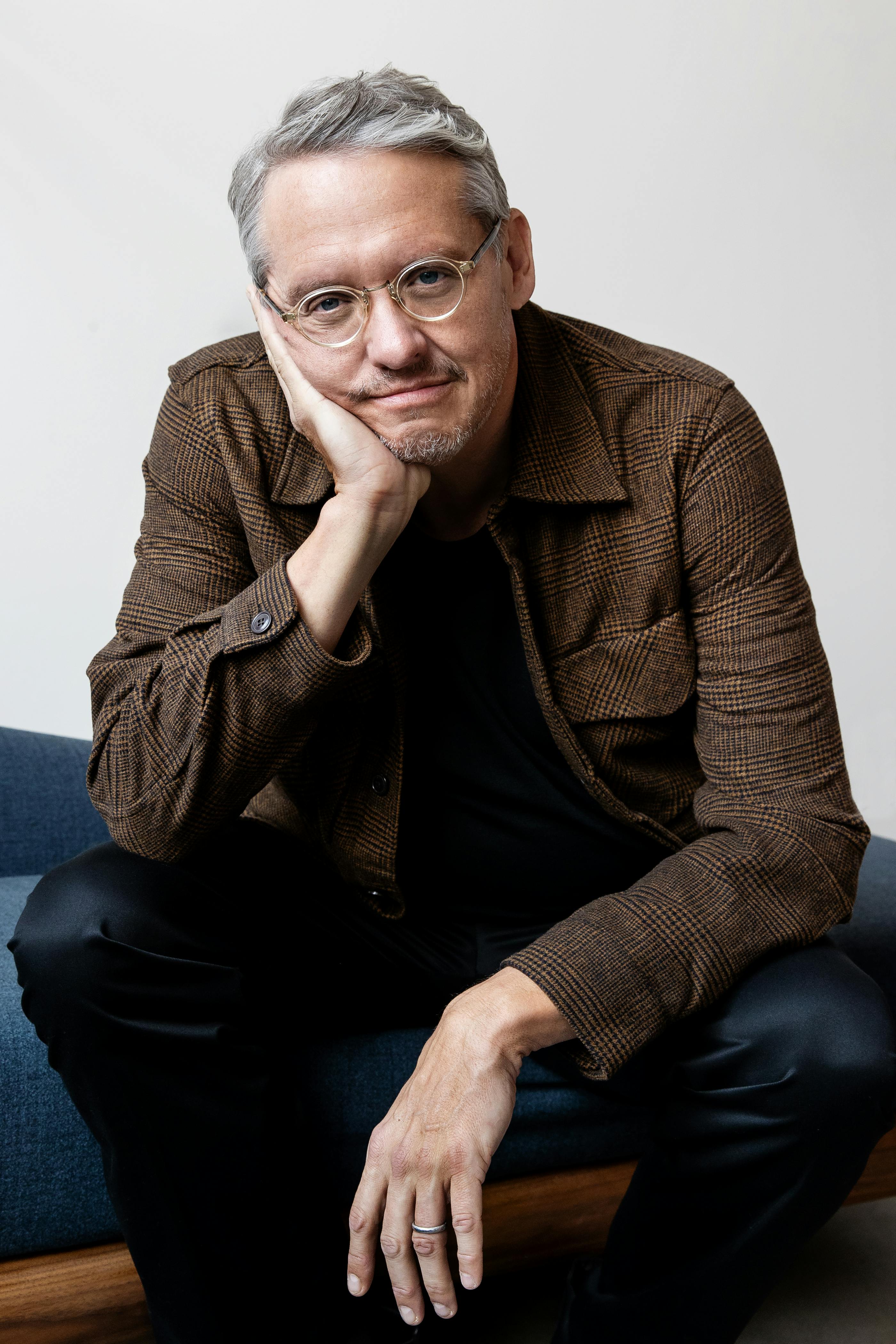The writer-director keeps us laughing through the fear with the star-studded Don't Look Up.
When it comes right down to it, writer-director Adam McKay might be one of the most brilliant minds of his generation. McKay has displayed his sharp satirical wit with such films as The Big Short, detailing the real estate crash of 2008, and Vice, on the storied life and career of former Vice President Dick Cheney. Though not exactly natural subjects for comedy, in both cases, McKay cleverly translated to the screen, with great humor and knowing insight, the societal predicaments and outsized personalities that have shaped our modern world.
With his latest, Don’t Look Up, the Oscar-nominated filmmaker is at it all over again. His star-studded (and we mean star-studded) end-of-the-world send-up begins with a pair of astronomers, played by Leonardo DiCaprio and Jennifer Lawrence, discovering a comet that is headed straight for Earth. But as they try to warn the world of impending doom, they’re stymied at every turn: by an inept president, played exquisitely by Meryl Streep, who believes the best course of action is to “sit tight and assess,” and by a media machine, fueled by Tyler Perry and Cate Blanchett, designed to churn out only upbeat infotainment and conspiracy theories that spread like wildfire on social media.
If Don’t Look Up weren’t so painfully funny, it would be downright terrifying — it hits exactly where we hope the comet won’t: very close to home. “That was a constant battle with this movie given where the real world is right now,” McKay says. Remarkably, the filmmaker wrote Don’t Look Up before COVID upended the global order. McKay discussed how the film came together, along with memorable highlights from his career in comedy. Listen to the entire conversation on Present Company with Krista Smith.

Niko Tavernise
Krista Smith: The fact that you wrote this film before the pandemic is staggering to me. What was the genesis?
Adam McKay: It was 12, 13, 14 years ago; I started really becoming aware of the climate crisis, and everything I was hearing was so startling to me. It was so much more jarring and so much more epic than I ever imagined. I started to realize, Oh, you’ve got to do a movie about this.But how in God’s name do you address something this gigantic? It’s like being alive when Krakatoa erupted and you’re like, Hey, something’s going on with that volcano. That mountain, it’s awfully smoky. Let me write a little play about that. So I did what I always do — I wrote five or six premises for movies, two-page treatments. One was a big epic drama. Another was a Twilight Zone-style thriller with a twist. They were all pretty cool, but it wasn’t until I was talking to my friend, David Sirota about three years ago [that I homed in on this idea]. He had tweeted a simple joke about, Oh, the comet is headed toward Earth, and no one seems to care. That idea was a big enough entryway, yet simple enough — it’s a reference we all immediately get. We’ve all seen those disaster movies. We’ve all seen Jaws. We’ve all seen The Towering Inferno. Even when you get into the Marvel universe, every one of those movies is going to end with the world ending. I said to David, “I think that’s the idea.”I picked this because it could be funny. It’s important to be able to laugh while we feel all the craziness going on now.
Being from the media myself, there were points when I thought I could be watching a documentary. One of the through-lines I was really struck by was this collapse of communication. There’s just no way for the scientists to get their message across in this landscape we have now.
AM: The theme of the movie is this giant media — cultural, social media, internet — machine that we built is really one glorified sales pitch to make all of us feel good. The last thing it wants to do is give you bad news. We know for a fact that the livable atmosphere is collapsing, yet day in, day out, I see a media machine that doesn’t want to say it that nakedly. And then what do they do? They cut to commercials for oil companies or gas trucks and cars. I’m not blaming any individuals. There’s a lot of great journalists out there working really hard. I would say it’s a systemic problem. I just watched Broadcast News with my oldest daughter. James L. Brooks really nailed it with that movie. That’s the exact moment where broadcast journalism was undone, when they folded it into the entertainment division, and the way that we communicate with each other became profit-driven — you had to not only be able to communicate information, but you had to sell advertising while doing it. It’s a dangerous situation that we’re in and one that’s screaming for some sort of redress, but our very government has been captured by these same forces. We know for a fact that Facebook is undoing the fabric of democracy yet I’m not hearing of any bills being proposed to reform or to regulate these social media giants. It’s both horrifying and hilariously funny. I mean, I see Mark Zuckerberg speak in public and I’m like, If he were a supervillain in a Marvel movie, it would be too over the top.

Adam McKay and Jennifer Lawrence
Niko Tavernise
What was that first moment when you realized comedy was speaking to you, that this is where your career was going to be?
AM: I had a mom who was really funny. As a little kid, she would read us bedtime stories about, like, “Bobby and Susie go shopping,” and she would change the stories so that the kids were shoplifting. We would laugh so hard. I have a dad who loves comedy and has a great big laugh. I loved, when I was a kid, doing prank phone calls, throwing snowballs at cars. From the youngest age, I remember listening to Steve Martin records on vinyl. Monty Python was an awakening moment for me when I saw them on PBS back in the 70s. Eddie Murphy too, was another one, like, Where did this guy come from? It wasn’t until I was in high school that cable TV hit, and you started seeing people like David Letterman and obviously SNL, then later sketch groups like Kids in the Hall. I started realizing, You can do this for a living. Because back in the 70s, it would have been crazy to consider doing it for a living. There just weren’t enough jobs. With the explosion of cable TV and the increase in the number of movies, I remember my senior year in high school and freshman year in college, starting to think, Maybe I could do this.
I see Mark Zuckerberg speak in public and I’m like, If he were a supervillain in a Marvel movie, it would be too over the top.
Adam McKay
You landed on SNL in 1995. You and Will Ferrell started on the same day. How hard is that SNL day job?
AM: I mean, that’s the dream job, that’s as good as you get, but at the same time, very hard: 80-hour weeks, no sleep, you’re writing all night long. And I just couldn’t have loved it more. It was everything I had ever wanted to do. The shock for me was after my first year when Lorne and our producer Steve Higgins were like, We want to make you head writer. I thought it was a joke. The only tricky thing was I was 27 when I was hired, so I was still a headstrong, strident comedy snob. It took me about two years to remember, This is Lorne Michaels’s show. Once I got over the idea that I was the great reformer of SNL and relaxed a little bit, I had the best time. I learned so much at that place — not only sketch writing and collaborating and producing, but most importantly, directing films. I did like 15 or 16 short films, and Lorne got a budget for me for my own crew. It was invaluable.

Meryl Streep and Don't Look Up crew members
Niko Tavernise
After you co-founded Funny or Die in 2007, “The Landlord” clip, starring your youngest daughter Pearl, went viral almost immediately. Has she forgiven you?
AM: It’s still funny. Pearl is 16 years old, the sweetest person you’ll ever meet. When we made the video, my wife was like, Don’t you dare make our daughter a child star. I was like, Don’t worry about it. It’s just a little video with Will. It’ll get a few million views. Of course, it got 200 million views or whatever. She wasn’t even two, and I’ll never forget, we were at a swimming pool at a hotel, and people recognized her. A crowd gathered around her. My wife just looked at me like, I want to choke you. Pearl got offers for movies. She literally got offered a Jackie Chan movie, but my wife shut that down — and because of that, it let Pearl go back to having a normal childhood. It’s turned out to be a fun thing that she had that experience, and she can look back on it and laugh. Credit to my wife because, honestly, I might’ve let her keep acting. I just thought it was such a kick.
